Implementing Evidence Based Practice in Adult Nursing PDF
Added on 2021-01-02
45 Pages4126 Words59 Views
Implementing Evidence Based
Practice in Adult Nursing
Practice in Adult Nursing
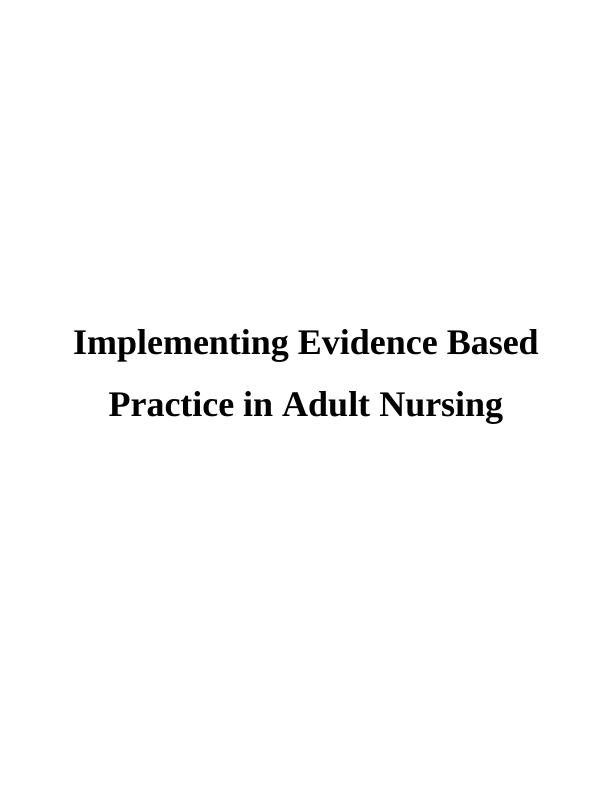
Table of Contents
INTRODUCTION...........................................................................................................................1
MAIN BODY...................................................................................................................................1
Frequency of drug errors in hospital on long shift among staff nurse....................................1
Improvement of patient safety and experience.......................................................................3
PEO model..............................................................................................................................5
CASP tool...............................................................................................................................7
PARIHS framework...............................................................................................................8
CONCLUSION................................................................................................................................9
REFERENCES..............................................................................................................................11
APPENDIX....................................................................................................................................12
INTRODUCTION...........................................................................................................................1
MAIN BODY...................................................................................................................................1
Frequency of drug errors in hospital on long shift among staff nurse....................................1
Improvement of patient safety and experience.......................................................................3
PEO model..............................................................................................................................5
CASP tool...............................................................................................................................7
PARIHS framework...............................................................................................................8
CONCLUSION................................................................................................................................9
REFERENCES..............................................................................................................................11
APPENDIX....................................................................................................................................12
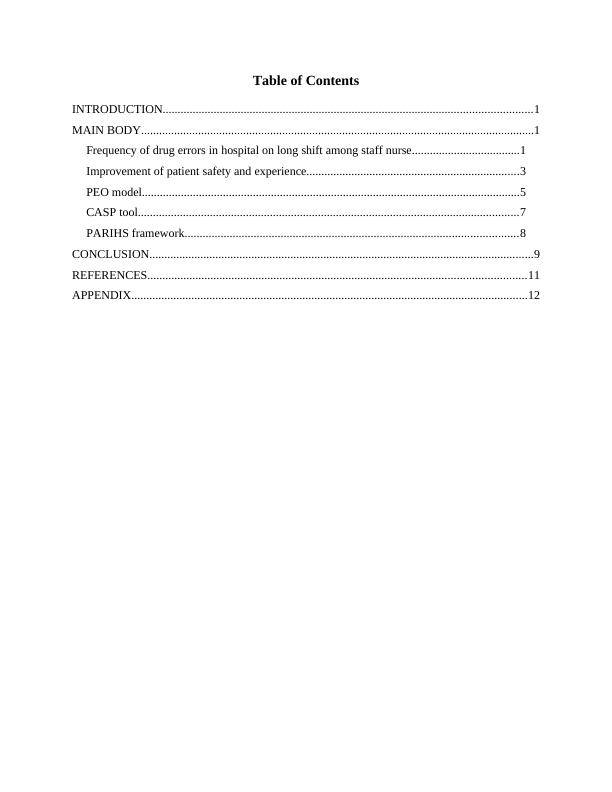

INTRODUCTION
The concept of Drug errors can be defined as 'inappropriate use of medication' or 'patient
harm' while the medication is under the control of healthcare professional or patient. It can be
considered as an essential aspect to reduce mistakes in medications in different healthcare
organisations because they are responsible for generating complex situations for patients
respectively (Hoga and et. al., 2014). However, it is important to monitor effects of administered
medications so that side effects can be determined therefore situation remains under control and
if necessary change suitable medication to patient for their welfare. Moreover, it is necessary for
healthcare organisations to put efforts in respect of preparing effective strategies for preventing
drug errors which can facilitate to improve patient outcomes along with decreasing chance of
complications. The present report will focus on frequency of drug errors in hospital on a long
shift among staff nurse and improvement of patient safety & experience. It involves several tools
such as the PEO model. CASP tool and PARIHS framework for describing drug errors.
MAIN BODY
Frequency of drug errors in hospital on long shift among staff nurse
The condition of drug error is known that situation in which incorrect dosage of
medication has been administered by care professionals or sick person. It consist inaccurate
administration of medication for patients that may responsible for developing extreme
complicated circumstances or may results into death of an individual. However, the correct
delivery of drug consists following the “5 rights” i.e., the right drug, the right dose, the right
route, the right time and the right patient. There are various types of errors which may occur in
hospitals and it is essential to understand them for reducing the same from happening (Merriam
and Grenier, 2019). It is important to analysed such places where errors may occur such as
utilising the reporting system, safe storage, patient admission, ordering, transcribing &
reviewing, preparing, dispensing, administration mistakes, monitoring effects of medication,
discharge of patient and evaluation of systems & procedures for avoiding errors. Moreover, there
are certain factors which are responsible for contributing to medication mistakes including work
environment in context of trained staff, language barriers, sleep deprivation, lack of information
and medication sound-alike names, inexperience not enough training.
1
The concept of Drug errors can be defined as 'inappropriate use of medication' or 'patient
harm' while the medication is under the control of healthcare professional or patient. It can be
considered as an essential aspect to reduce mistakes in medications in different healthcare
organisations because they are responsible for generating complex situations for patients
respectively (Hoga and et. al., 2014). However, it is important to monitor effects of administered
medications so that side effects can be determined therefore situation remains under control and
if necessary change suitable medication to patient for their welfare. Moreover, it is necessary for
healthcare organisations to put efforts in respect of preparing effective strategies for preventing
drug errors which can facilitate to improve patient outcomes along with decreasing chance of
complications. The present report will focus on frequency of drug errors in hospital on a long
shift among staff nurse and improvement of patient safety & experience. It involves several tools
such as the PEO model. CASP tool and PARIHS framework for describing drug errors.
MAIN BODY
Frequency of drug errors in hospital on long shift among staff nurse
The condition of drug error is known that situation in which incorrect dosage of
medication has been administered by care professionals or sick person. It consist inaccurate
administration of medication for patients that may responsible for developing extreme
complicated circumstances or may results into death of an individual. However, the correct
delivery of drug consists following the “5 rights” i.e., the right drug, the right dose, the right
route, the right time and the right patient. There are various types of errors which may occur in
hospitals and it is essential to understand them for reducing the same from happening (Merriam
and Grenier, 2019). It is important to analysed such places where errors may occur such as
utilising the reporting system, safe storage, patient admission, ordering, transcribing &
reviewing, preparing, dispensing, administration mistakes, monitoring effects of medication,
discharge of patient and evaluation of systems & procedures for avoiding errors. Moreover, there
are certain factors which are responsible for contributing to medication mistakes including work
environment in context of trained staff, language barriers, sleep deprivation, lack of information
and medication sound-alike names, inexperience not enough training.
1
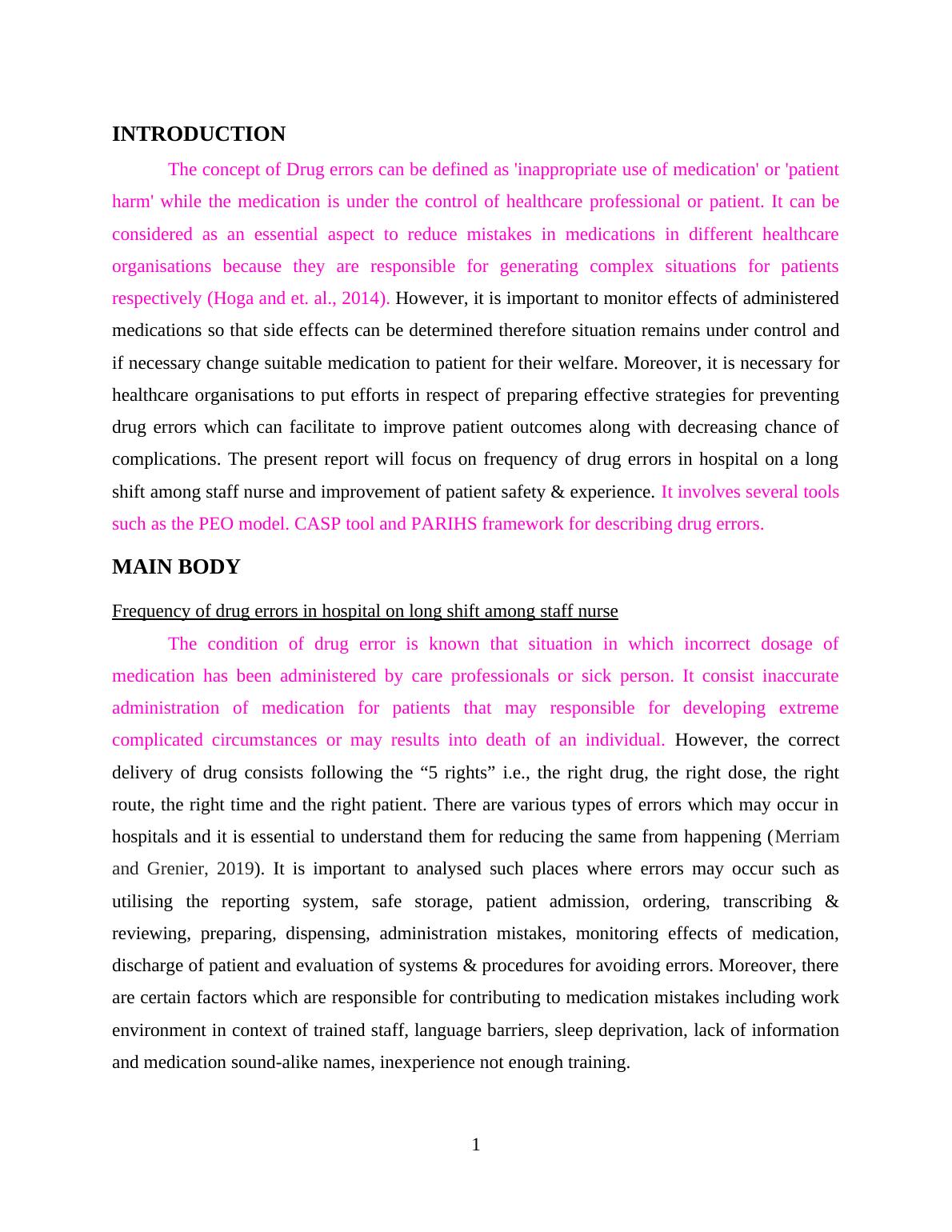
Initially, Ordering errors involves the situation when specialists orders incorrect drug,
dose, a drug to which a sick person is allergic or suffers duplication in therapy. It also involves
mistakes in handwritten prescriptions due to sloppy handwriting and confusion which take place
at decimal points. Secondly, Administering errors refer to an attempt of giving incorrect drug,
with inaccurate doses or through wrong route which is common in healthcare organisations
including patient controlled analgesics pumps. This involves the capability of service users to use
pump due to programmed appropriately it can results into complicated dose effects and other
critical harms (Holloway and Galvin, 2016). Thirdly, Transcription errors include the data entry
of wrong information regarding medication administration record by non-medical personnel. It
involves the requirement for nurses to have proper system at work place in order to determine
potential errors. Moreover, Dispensing errors can be described as wrong pharmacy's supplying
an incorrect medication or dose.
Nurses are required to work for longer shifts due to employment of extended working
hours and overtime in hospitals, observed mainly due to shortage of registered nurse (RN). The
risk of medication errors increases if a nurse works for more than 12 hours and above in single
shift and it impacts negatively on their performance. However, there are several trends and
staffing patterns which are used in healthcare institutions that are responsible for generating even
hazardous conditions for security of patient.
In addition to this, nurses are required to perform in specialised units such as dialysis,
surgery and intensive care for extra long hours. It has been analysed that these nurses did not get
proper recovery time between shifts and their working hours may even increase up to 16 hours
which does not contribute for improvement in patient outcomes and experience. Moreover, it has
been analysed the mental stress take place in nursing staff because of additional working hours
which impacts negatively on their performance and patients outcomes (Leung, Trevena and
Waters, 2014). Apart from this, patient file complaints relating to care provided by nurses as they
are not able to attend bulk of people at particular time and it takes more duration to provide care
for number of sick individuals. However, it is evaluated that extended working hours may create
certain problems including stress, burnout, musculoskeletal disorders and other health problems
for nurses due to lack of rest. Meanwhile, such problems are increase chance of medication
errors which may facilitate severe medical situation for an infected person. Additionally, excess
2
dose, a drug to which a sick person is allergic or suffers duplication in therapy. It also involves
mistakes in handwritten prescriptions due to sloppy handwriting and confusion which take place
at decimal points. Secondly, Administering errors refer to an attempt of giving incorrect drug,
with inaccurate doses or through wrong route which is common in healthcare organisations
including patient controlled analgesics pumps. This involves the capability of service users to use
pump due to programmed appropriately it can results into complicated dose effects and other
critical harms (Holloway and Galvin, 2016). Thirdly, Transcription errors include the data entry
of wrong information regarding medication administration record by non-medical personnel. It
involves the requirement for nurses to have proper system at work place in order to determine
potential errors. Moreover, Dispensing errors can be described as wrong pharmacy's supplying
an incorrect medication or dose.
Nurses are required to work for longer shifts due to employment of extended working
hours and overtime in hospitals, observed mainly due to shortage of registered nurse (RN). The
risk of medication errors increases if a nurse works for more than 12 hours and above in single
shift and it impacts negatively on their performance. However, there are several trends and
staffing patterns which are used in healthcare institutions that are responsible for generating even
hazardous conditions for security of patient.
In addition to this, nurses are required to perform in specialised units such as dialysis,
surgery and intensive care for extra long hours. It has been analysed that these nurses did not get
proper recovery time between shifts and their working hours may even increase up to 16 hours
which does not contribute for improvement in patient outcomes and experience. Moreover, it has
been analysed the mental stress take place in nursing staff because of additional working hours
which impacts negatively on their performance and patients outcomes (Leung, Trevena and
Waters, 2014). Apart from this, patient file complaints relating to care provided by nurses as they
are not able to attend bulk of people at particular time and it takes more duration to provide care
for number of sick individuals. However, it is evaluated that extended working hours may create
certain problems including stress, burnout, musculoskeletal disorders and other health problems
for nurses due to lack of rest. Meanwhile, such problems are increase chance of medication
errors which may facilitate severe medical situation for an infected person. Additionally, excess
2
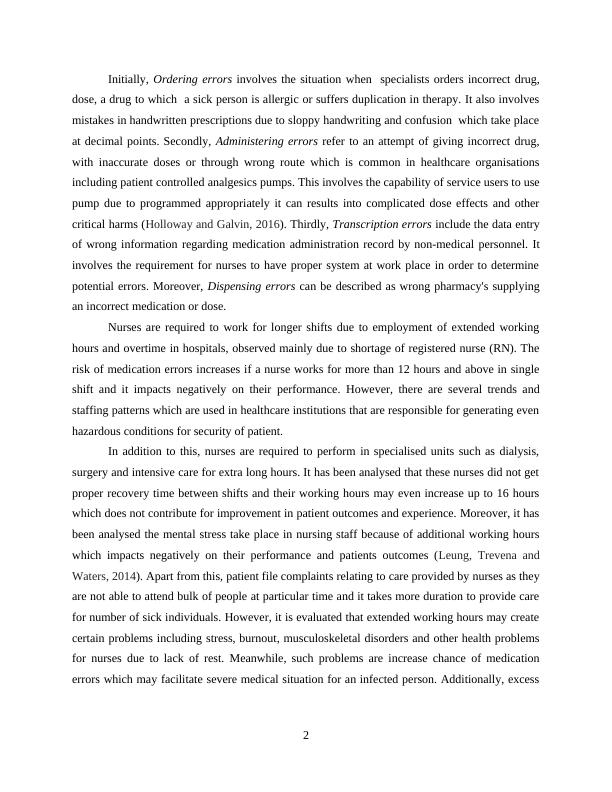
work pressure may responsible for reduced patients satisfaction and experience because single
nurse is not capable to render care for number of people on specific time.
At the other hand, it has been analysed that frequency of drug errors are mostly related to
wrong dosage, drug and patient among nursing staff in healthcare organisations. It is necessary to
focus on these factors and make more effective as well as efficient care plan in order to reduce
frequency of dosage errors. However, it is supportive to establish an effective care plan which
facilitate to decrease complexities in care homes and improve patients experiences accordingly.
Meanwhile, it has been analysed that the cases adjacent to mistakes in medications are more in
number as compared to the situations of actual drug error in performance of nursing staff in
hospital (Buckley, McCormack and Ryan, 2014). Moreover, work duration, overtime and
number of hours performed by nurses in a week had significant effects on errors.
Improvement of patient safety and experience
The safety of sick people is one of the important aspect for medical practitioners at the
time of conducting diagnosing as well as treatment process for specific person. It involves
remaining concentrated and serving correct dosage of assigned medication so that a person will
become disease free very soon. However, it is necessary to consider drug errors to be focussed in
order to make efficient strategies to reduce them which facilitate to increase better outcomes.
Moreover, the healthcare organisations are required to establish more effective as well as
efficient nursing care plan to decrease chance of medication mistakes so that an appropriate
treatment can be deliver to needy individuals for their welfare (Ernst and et. al., 2014). The
medication mistakes are responsible for creating serious and costly consequences like increased
stay of patient, extra medical interventions, severe harm or even death. There are various types of
strategies which cab be applied by health care organisations in nursing plans in order to reduce
drug errors and improving patient safety & experience.
Ensure the five rights of medication administration – This involves institutional
policies which are required to be followed by nursing staff while providing care to people along
with considering five important rights of medical administrations. However, it consist the criteria
of making sure that correct medication should be given to right patient in appropriate dosage
through the correct route at desired time which facilitates in reducing errors along with
improving patient safety & experience.
3
nurse is not capable to render care for number of people on specific time.
At the other hand, it has been analysed that frequency of drug errors are mostly related to
wrong dosage, drug and patient among nursing staff in healthcare organisations. It is necessary to
focus on these factors and make more effective as well as efficient care plan in order to reduce
frequency of dosage errors. However, it is supportive to establish an effective care plan which
facilitate to decrease complexities in care homes and improve patients experiences accordingly.
Meanwhile, it has been analysed that the cases adjacent to mistakes in medications are more in
number as compared to the situations of actual drug error in performance of nursing staff in
hospital (Buckley, McCormack and Ryan, 2014). Moreover, work duration, overtime and
number of hours performed by nurses in a week had significant effects on errors.
Improvement of patient safety and experience
The safety of sick people is one of the important aspect for medical practitioners at the
time of conducting diagnosing as well as treatment process for specific person. It involves
remaining concentrated and serving correct dosage of assigned medication so that a person will
become disease free very soon. However, it is necessary to consider drug errors to be focussed in
order to make efficient strategies to reduce them which facilitate to increase better outcomes.
Moreover, the healthcare organisations are required to establish more effective as well as
efficient nursing care plan to decrease chance of medication mistakes so that an appropriate
treatment can be deliver to needy individuals for their welfare (Ernst and et. al., 2014). The
medication mistakes are responsible for creating serious and costly consequences like increased
stay of patient, extra medical interventions, severe harm or even death. There are various types of
strategies which cab be applied by health care organisations in nursing plans in order to reduce
drug errors and improving patient safety & experience.
Ensure the five rights of medication administration – This involves institutional
policies which are required to be followed by nursing staff while providing care to people along
with considering five important rights of medical administrations. However, it consist the criteria
of making sure that correct medication should be given to right patient in appropriate dosage
through the correct route at desired time which facilitates in reducing errors along with
improving patient safety & experience.
3
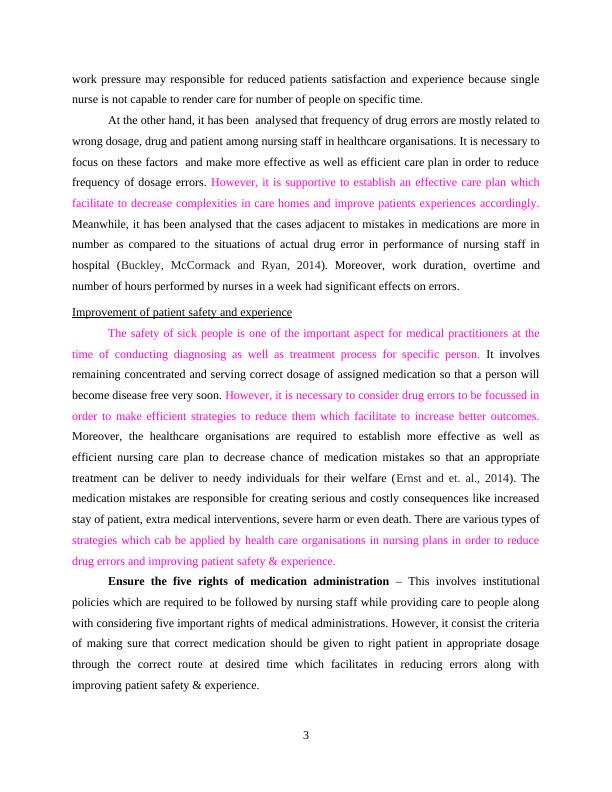
Follow proper medication reconciliation procedures – The hospitals have technique
for medication reconciliation at the time of patient transfer to another institution due to some
reasons. Apart from transfer documents and orders, It is necessary to review and verify every
medication in order to render correct medicine with correct dosage by right route at desired time
for right patient. However, nursing staff should recheck the medication administration records
(MAR) and verify information by available sources like patient's family or specialist. Moreover,
it is helpful in respect of preventing errors in medication that are relevant to in appropriate
reconciliation and facilitate to boost up safety and experience of service users (Lahti and et. al.,
2014).
Double check—or even triple check—procedures – This includes the rechecking of
records of patient by nursing staff at the time changing their working shifts and review all new
orders of physicians. It is helpful in making sure that proper medication is being provided to
infected person and maintain their records in accurate manner. In this context, it has been
determined in several organisations that they prefer to use chart flag process in place of highlight
charts with new orders which needs order verification. This will result into reducing medication
errors and increase patients outcomes.
Have the physician (or another nurse) read it back – The procedure is required to be
consider by nursing staff including read back an order to by physician or another nurse for
ensuring that ordered medication will transcribed in appropriate manner. It is essential as it will
be helpful in maintaining correct medical records of patients in respect of decreasing drug errors
along with boosting up outcomes accuracy which facilitate to improve satisfaction of service
user.
Consider using a name alert – This involve to the communication regarding
medications may similar in names as their pronunciation may create confusion which can results
into medication error. Meanwhile, it is important to that name alerts should posted amongst
MAR that can prevent errors of medications accordingly.
Place a zero in front of the decimal point – The zero is mandatory to be put before
decimal while prescribing medicines because it may interpret in wrong way which impacts
negatively on medical condition of sick individual. For example, a dosage of 0.25mg may easily
construed as 25 mg without mentioning zero which facilitate to results into severe outcomes for
4
for medication reconciliation at the time of patient transfer to another institution due to some
reasons. Apart from transfer documents and orders, It is necessary to review and verify every
medication in order to render correct medicine with correct dosage by right route at desired time
for right patient. However, nursing staff should recheck the medication administration records
(MAR) and verify information by available sources like patient's family or specialist. Moreover,
it is helpful in respect of preventing errors in medication that are relevant to in appropriate
reconciliation and facilitate to boost up safety and experience of service users (Lahti and et. al.,
2014).
Double check—or even triple check—procedures – This includes the rechecking of
records of patient by nursing staff at the time changing their working shifts and review all new
orders of physicians. It is helpful in making sure that proper medication is being provided to
infected person and maintain their records in accurate manner. In this context, it has been
determined in several organisations that they prefer to use chart flag process in place of highlight
charts with new orders which needs order verification. This will result into reducing medication
errors and increase patients outcomes.
Have the physician (or another nurse) read it back – The procedure is required to be
consider by nursing staff including read back an order to by physician or another nurse for
ensuring that ordered medication will transcribed in appropriate manner. It is essential as it will
be helpful in maintaining correct medical records of patients in respect of decreasing drug errors
along with boosting up outcomes accuracy which facilitate to improve satisfaction of service
user.
Consider using a name alert – This involve to the communication regarding
medications may similar in names as their pronunciation may create confusion which can results
into medication error. Meanwhile, it is important to that name alerts should posted amongst
MAR that can prevent errors of medications accordingly.
Place a zero in front of the decimal point – The zero is mandatory to be put before
decimal while prescribing medicines because it may interpret in wrong way which impacts
negatively on medical condition of sick individual. For example, a dosage of 0.25mg may easily
construed as 25 mg without mentioning zero which facilitate to results into severe outcomes for
4
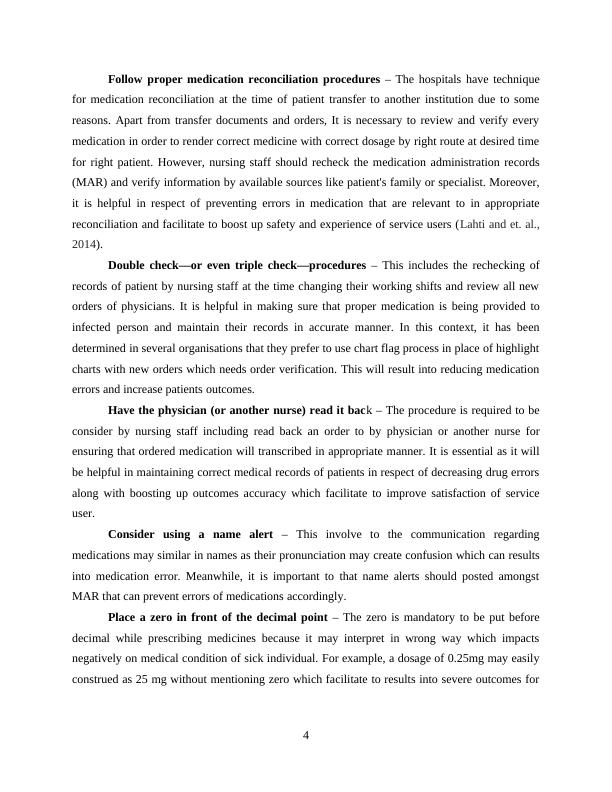
patient. Furthermore, nurses should prefer to use zero before decimal properly which helps in
increasing accuracy of medication and experience of sick person.
Document everything – This consist the criteria of maintaining every record related top
infected people, legible documentation and medication labelling. It has been observed that lack
of proper documentation results into medication errors. However, the nurses should read the
prescription label and expiration date of medication so that major errors relating to drug errors
are reduced and simultaneously assists in improving quality of medication (Rice and et. al.,
2014).
Ensure proper storage of medications for proper efficacy – The storage of
medications is very important because exposure of medicines to environment may convert it into
another compound which can be poisonous for patient. It is essential to store the medication in
accurate environment. For instance medication to be stored in refrigerator, dark area and other
cool atmosphere so that their actual chemical composition can be maintained appropriately.
Moreover, nurses are required to take care of storage and remain conscious about expiry date
after opening the seal which facilitate to reduce chance of drug errors and increase satisfaction of
infected individual.
Follow institution’s medication administration policies, regulations, and guidelines –
This refers to appropriate rules and policies of particular hospital which are formed and
implemented by keeping in mind correctness of medication. These regulations are helpful to
make right attempt of providing care to sick person by nursing staff and facilitate to reduce risk
of drug errors respectively.
PEO model
The concept of The PEO model is consider as the most useful method for qualitative
research which is favourable to determine desired factors for investigation and gaining outcomes
of the same. It includes number of components such as population face problems, exposure and
outcomes or themes which are required to conduct specific research in appropriate manner.
However, it has been analysed that extended working hours and extra work load on service
provider results into increase in medication errors which can lead to severe outcomes. Mistakes
in medication process leads to creation of complications in medical condition of sick individual
or even cause death therefore, it is necessary to focus on such issue to reduce the same
accurately. Moreover, it is analysed the cause of problem of nursing staff regarding their
5
increasing accuracy of medication and experience of sick person.
Document everything – This consist the criteria of maintaining every record related top
infected people, legible documentation and medication labelling. It has been observed that lack
of proper documentation results into medication errors. However, the nurses should read the
prescription label and expiration date of medication so that major errors relating to drug errors
are reduced and simultaneously assists in improving quality of medication (Rice and et. al.,
2014).
Ensure proper storage of medications for proper efficacy – The storage of
medications is very important because exposure of medicines to environment may convert it into
another compound which can be poisonous for patient. It is essential to store the medication in
accurate environment. For instance medication to be stored in refrigerator, dark area and other
cool atmosphere so that their actual chemical composition can be maintained appropriately.
Moreover, nurses are required to take care of storage and remain conscious about expiry date
after opening the seal which facilitate to reduce chance of drug errors and increase satisfaction of
infected individual.
Follow institution’s medication administration policies, regulations, and guidelines –
This refers to appropriate rules and policies of particular hospital which are formed and
implemented by keeping in mind correctness of medication. These regulations are helpful to
make right attempt of providing care to sick person by nursing staff and facilitate to reduce risk
of drug errors respectively.
PEO model
The concept of The PEO model is consider as the most useful method for qualitative
research which is favourable to determine desired factors for investigation and gaining outcomes
of the same. It includes number of components such as population face problems, exposure and
outcomes or themes which are required to conduct specific research in appropriate manner.
However, it has been analysed that extended working hours and extra work load on service
provider results into increase in medication errors which can lead to severe outcomes. Mistakes
in medication process leads to creation of complications in medical condition of sick individual
or even cause death therefore, it is necessary to focus on such issue to reduce the same
accurately. Moreover, it is analysed the cause of problem of nursing staff regarding their
5
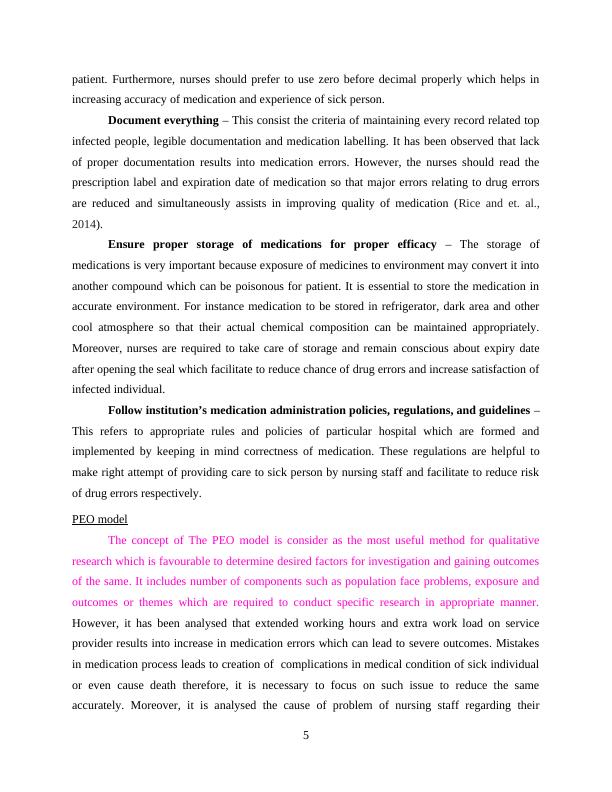
End of preview
Want to access all the pages? Upload your documents or become a member.
Related Documents
5 MEDICATION ERRORS MEDICATION ERRORS MEDICATION ERRORS Name Institutional affiliationlg...
|5
|1789
|361
Critical Appraisal of an Article on Medication Safety Practiceslg...
|7
|1916
|484
Medication Safety: Impact on Child and Family Nursing Practicelg...
|12
|3179
|28
Medication Errors | Reportlg...
|18
|4206
|9
NURS2006 Supplementary Assessmentlg...
|12
|5338
|55
(Solved) Essay on Medication Errorlg...
|12
|3254
|837
